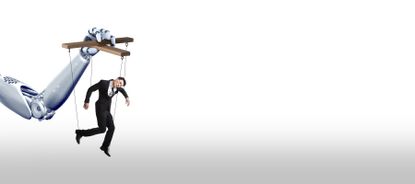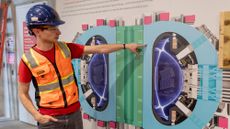The dark side of tech
When technological change is destabilizing, radical political movements inevitably rise


If you want to understand how Donald Trump became president of the United States and why his fellow populists and nationalists are on the march across wide swaths of Europe, you could do worse than to glance at the smartphone you interact with about 500 times a day.
No, the incredibly powerful computer nearly all of us carry around in our pockets and purses didn't give us Trump. But this ubiquitous piece of technology is as much an avatar of our historical moment as the factory or sweat shop was for the age of the industrial revolution. That was the last time in our history when destabilizing technological change led to the rise of radical political movements of the anti-liberal right and left. Those who supported those movements did so in reaction to the sense that their lives were spinning out of control, with technological innovations and resulting economic trends seeming to master us rather than the other way around.
That brings us to the fate of Elaine Herzberg, the 49-year-old woman who was struck and killed on Sunday evening by a self-driving car while walking her bicycle on the street in Tempe, Arizona. Tens of thousands of people die in automotive-related accidents every year in the United States, so a single death from a malfunctioning piece of cutting-edge technology that could eventually save a lot of those lives doesn't mean that the innovation should be opposed.
Subscribe to The Week
Escape your echo chamber. Get the facts behind the news, plus analysis from multiple perspectives.

Sign up for The Week's Free Newsletters
From our morning news briefing to a weekly Good News Newsletter, get the best of The Week delivered directly to your inbox.
From our morning news briefing to a weekly Good News Newsletter, get the best of The Week delivered directly to your inbox.
Yet for many people, even raising the possibility of imposing restrictions on the development of driverless technology can seem outrageous. And that tells us something important, and potentially ominous, about our world and our times.
When it comes to technological changes, most of us simply accept that they should proceed of their own logic. Suggest that the world doesn't need driverless cars, that we get along perfectly fine without them, and you'll inspire a mixture of outrage and stupefaction, as if the very hint that one might object to a pending innovation and seek to limit its development is self-evidently illegitimate. The protestations flow forth in a torrent: "What if they'd said this about the first automobiles? Or airplanes? Or computers? Just think of all the human benefits that followed from these and so many other examples of technological progress!"
That's one type of objection to technology — assuming that all innovation is either benign or a blessing ("progress"), and hence that favoring the placement of any limits on it is as absurd as proposing to turn down a great and wondrous gift from a generous benefactor.
Then there's the objection of the market absolutists, who prefer to sidestep altogether the question of whether innovation is good to focus instead on the inexorability of technological developments within the capitalist marketplace. Because such developments supposedly happen of their own accord, as the byproduct of profit-seeking on the part of free individuals, there is no way to constrain innovation short of imposing tyrannical restrictions on commerce. Like members of a species struggling to survive in a Darwinian natural world, people living under capitalism need to continually adapt to inevitable technological changes or else face certain extinction — if not the literal death suffered by Elaine Herzberg then the economic death confronting those working in industries on the verge of being snuffed out by the latest innovations.
The problem with both accounts of technological change is that they each counsel resignation and surrender, even when the outcome clearly makes people's lives worse. If driverless cars ultimately prevent thousands of fatalities a year, that will obviously be a benefit for the people who would otherwise have died. But what about the millions of long-haul truck drivers, taxi and limo drivers, and FedEx and UPS drivers who will end up unemployed by the innovation?
How many communities will be decimated by the loss of these jobs? How many individuals and families will be impoverished as a result? How many of those who find themselves without a job will be added to the ranks of the permanently unemployed, forced to contend with acute, long-term economic and psychological distress? How many of these will join the millions who have already sought relief in fatal addiction to painkillers as they struggle to cope with the decline of America's manufacturing sector?
And how many of these economically and spiritually immiserated millions will find themselves drawn to the cathartic anger of populist politics and its false promises of simple solutions to complicated problems?
Technological innovation benefits us in innumerable ways, but its downsides receive too little attention. Twitter facilitates the communication of information, but it also provided Trump with a megaphone to help build political support for his presidential campaign, just as it powerfully amplifies the voices of extremists of all political stripes. Facebook allows us to easily share personal and political news, but it also sells information about our habits and opinions to the highest bidder, spreads populist poison around the globe, and may have played a significant role in helping the Trump campaign across the finish line in 2016.
In a subtler but no less significant way, the advent of advanced automation (including driverless cars) may benefit many of us while also destabilizing the lives of millions and contributing to the further radicalization of our politics.
The proper response to this threat is not to dismiss the danger or deny anything can be done about it. It's to recognize the hazard and act to minimize it.
Technology isn't our master. We're the ones in charge. If democracy means anything, it must mean that.
Sign up for Today's Best Articles in your inbox
A free daily email with the biggest news stories of the day – and the best features from TheWeek.com
Damon Linker is a senior correspondent at TheWeek.com. He is also a former contributing editor at The New Republic and the author of The Theocons and The Religious Test.
-
 'The disconnect between actual health care and the insurance model is widening'
'The disconnect between actual health care and the insurance model is widening'Instant Opinion Opinion, comment and editorials of the day
By Anya Jaremko-Greenwold, The Week US Published
-
 Cautious optimism surrounds plans for the world's first nuclear fusion power plant
Cautious optimism surrounds plans for the world's first nuclear fusion power plantTalking Point Some in the industry feel that the plant will face many challenges
By Justin Klawans, The Week US Published
-
 Explore new worlds this winter at these 6 enlightening museum exhibitions
Explore new worlds this winter at these 6 enlightening museum exhibitionsThe Week Recommends Discover the estrados of Spain and the connection between art and chess in various African countries
By Catherine Garcia, The Week US Published
-
 US election: who the billionaires are backing
US election: who the billionaires are backingThe Explainer More have endorsed Kamala Harris than Donald Trump, but among the 'ultra-rich' the split is more even
By Harriet Marsden, The Week UK Published
-
 US election: where things stand with one week to go
US election: where things stand with one week to goThe Explainer Harris' lead in the polls has been narrowing in Trump's favour, but her campaign remains 'cautiously optimistic'
By Harriet Marsden, The Week UK Published
-
 Is Trump okay?
Is Trump okay?Today's Big Question Former president's mental fitness and alleged cognitive decline firmly back in the spotlight after 'bizarre' town hall event
By Harriet Marsden, The Week UK Published
-
 The life and times of Kamala Harris
The life and times of Kamala HarrisThe Explainer The vice-president is narrowly leading the race to become the next US president. How did she get to where she is now?
By The Week UK Published
-
 Will 'weirdly civil' VP debate move dial in US election?
Will 'weirdly civil' VP debate move dial in US election?Today's Big Question 'Diametrically opposed' candidates showed 'a lot of commonality' on some issues, but offered competing visions for America's future and democracy
By Harriet Marsden, The Week UK Published
-
 1 of 6 'Trump Train' drivers liable in Biden bus blockade
1 of 6 'Trump Train' drivers liable in Biden bus blockadeSpeed Read Only one of the accused was found liable in the case concerning the deliberate slowing of a 2020 Biden campaign bus
By Peter Weber, The Week US Published
-
 How could J.D. Vance impact the special relationship?
How could J.D. Vance impact the special relationship?Today's Big Question Trump's hawkish pick for VP said UK is the first 'truly Islamist country' with a nuclear weapon
By Harriet Marsden, The Week UK Published
-
 Biden, Trump urge calm after assassination attempt
Biden, Trump urge calm after assassination attemptSpeed Reads A 20-year-old gunman grazed Trump's ear and fatally shot a rally attendee on Saturday
By Peter Weber, The Week US Published